- Home
- H. P. Lovecraft
Dream Cycle of H. P. Lovecraft: Dreams of Terror and Death Page 2
Dream Cycle of H. P. Lovecraft: Dreams of Terror and Death Read online
Page 2
So matters went till that night when Williams brought home the infamous Necronomicon of the mad Arab Abdul Alhazred. He had known of the dreaded volume since his sixteenth year, when his dawning love of the bizarre had led him to ask queer questions of a bent old bookseller in Chandos Street; and he had always wondered why men paled when they spoke of it. The old bookseller had told him that only five copies were known to have survived the shocked edicts of the priests and lawgivers against it and that all of them were locked up with frightened care by custodians who had ventured to begin a reading of the hateful black-letter. But now, at last, he had not only found an accessible copy but had made it his own at a ridiculously low figure. It was at a Jew’s shop in the squalid precincts of Clare Market, where he had often bought strange things before, and he almost fancied the gnarled old Levite smiled amidst tangles of beard as the great discovery was made. The bulky leather cover with the brass clasp had been so prominently visible, and the price was so absurdly slight.
The one glimpse he had had of the title was enough to send him into transports, and some of the diagrams set in the vague Latin text excited the tensest and most disquieting recollections in his brain. He felt it was highly necessary to get the ponderous thing home and begin deciphering it, and bore it out of the shop with such precipitate haste that the old Jew chuckled disturbingly behind him. But when at last it was safe in his room he found the combination of black-letter and debased idiom too much for his powers as a linguist, and reluctantly called on his strange frightened friend for help with the twisted, mediaeval Latin. Lord Northam was simpering inanities to his streaked cat, and started violently when the young man entered. Then he saw the volume and shuddered wildly, and fainted altogether when Williams uttered the title. It was when he regained his senses that he told his story; told his fantastic figment of madness in frantic whispers lest his friend be not quick to burn the accursed book and give wide scattering to its ashes.
There must, Lord Northam whispered, have been something wrong at the start; but it would never have come to a head if he had not explored too far. He was the nineteenth Baron of a line whose beginnings went uncomfortably far back into the past—unbelievably far, if vague tradition could be heeded, for there were family tales of a descent from pre-Saxon times, when a certain Luneus Gabinius Capito, military tribune in the Third Augustan Legion then stationed at Lindum in Roman Britain, had been summarily expelled from his command for participation in certain rites unconnected with any known religion. Gabinius had, the rumour ran, come upon the cliffside cavern where strange folk met together and made the Elder Sign in the dark; strange folk whom the Britons knew not save in fear, and who were the last to survive from a great land in the west that had sunken, leaving only the islands with the roths and circles and shrines of which Stonehenge was the greatest. There was no certainty, of course, in the legend that Gabinius had built an impregnable fortress over the forbidden cave and founded a line which Pict and Saxon, Dane and Norman were powerless to obliterate; or in the tacit assumption that from this line sprang the bold companion and lieutenant of the Black Prince whom Edward Third created Baron of Northam. These things were not certain, yet they were often told; and in truth the stonework of Northam Keep did look alarmingly like the masonry of Hadrian’s Wall. As a child Lord Northam had had peculiar dreams when sleeping in the older parts of the castle, and had acquired a constant habit of looking back through his memory for half-amorphous scenes and patterns and impressions which formed no part of his waking experience. He became a dreamer who found life tame and unsatisfying; a searcher for strange realms and relationships once familiar, yet lying nowhere in the visible regions of the Earth.
Filled with a feeling that our tangible world is only an atom in a fabric vast and ominous, and that unknown demesnes press on and permeate the sphere of the known at every point, Northam in youth and young manhood drained in turn the founts of formal religion and occult mystery. Nowhere, however, could he find ease and content; and as he grew older the staleness and limitations of life became more and more maddening to him. During the ‘nineties he dabbled in Satanism, and at all times he devoured avidly any doctrine or theory which seemed to promise escape from the close vistas of science and the dully unvarying laws of Nature. Books like Ignatius Donnelly’s chimerical account of Atlantis he absorbed with zest, and a dozen obscure precursors of Charles Fort enthralled him with their vagaries. He would travel leagues to follow up a furtive village tale of abnormal wonder, and once went into the desert of Araby to seek a Nameless City of faint report, which no man has ever beheld. There rose within him the tantalising faith that somewhere an easy gate existed, which if one found would admit him freely to those outer deeps whose echoes rattled so dimly at the back of his memory. It might be in the visible world, yet it might be only in his mind and soul. Perhaps he held within his own half-explored brain that cryptic link which would awaken him to Elder and future lives in forgotten dimensions; which would bind him to the stars, and to the infinities and eternities beyond them….
(circa 1926)
The Thing in the Moonlight*
Morgan is not a literary man; in fact he cannot speak English with any degree of coherency. That is what makes me wonder about the words he wrote, though others have laughed.
He was alone the evening it happened. Suddenly an unconquerable urge to write came over him, and taking pen in hand he wrote the following:
My name is Howard Phillips. I live at 66 College Street, in Providence, Rhode Island. On November 24, 1927—for I know not even what the year may be now—, I fell asleep and dreamed, since when I have been unable to awaken.
My dream began in a dank, reed-choked marsh that lay under a gray autumn sky, with a rugged cliff of lichen-crusted stone rising to the north. Impelled by some obscure quest, I ascended a rift or cleft in this beetling precipice, noting as I did so the black mouths of many fearsome burrows extending from both walls into the depths of the stony plateau.
At several points the passage was roofed over by the choking of the upper parts of the narrow fissure; these places being exceeding dark, and forbidding the perception of such burrows as may have existed there. In one such dark space I felt conscious of a singular accession of fright, as if some subtle and bodiless emanation from the abyss were engulfing my spirit; but the blackness was too great for me to perceive the source of my alarm.
At length I emerged upon a tableland of moss-grown rock and scanty soil, lit by a faint moonlight which had replaced the expiring orb of day. Casting my eyes about, I beheld no living object; but was sensible of a very peculiar stirring far below me, amongst the whispering rushes of the pestilential swamp I had lately quitted.
After walking for some distance, I encountered the rusty tracks of a street railway, and the worm-eaten poles which still held the limp and sagging trolley wire. Following this line, I soon came upon a yellow, vestibuled car numbered 1852—of a plain, double-trucked type common from 1900 to 1910. It was untenanted, but evidently ready to start; the trolley being on the wire and the air-brake now and then throbbing beneath the floor. I boarded it and looked vainly about for the light switch—noting as I did so the absence of the controller handle, which thus implied the brief absence of the motorman. Then I sat down in one of the cross seats of the vehicle. Presently I heard a swishing in the sparse grass toward the left, and saw the dark forms of two men looming up in the moonlight. They had the regulation caps of a railway company, and I could not doubt but that they were conductor and motorman. Then one of them sniffed with singular sharpness, and raised his face to howl to the moon. The other dropped on all fours to run toward the car.
I leaped up at once and raced madly out of that car and across endless leagues of plateau till exhaustion forced me to stop—doing this not because the conductor had dropped on all fours, but because the face of the motorman was a mere white cone tapering to one blood-red-tentacle�
��.
I was aware that I only dreamed, but the very awareness was not pleasant.
Since that fearful night, I have prayed only for awakening—it has not come!
Instead I have found myself an inhabitant of this terrible dream world! That first night gave way to dawn, and I wandered aimlessly over the lonely swamp-lands. When night came, I still wandered, hoping for awakening. But suddenly I parted the weeds and saw before me the ancient railway car—and to one side a cone-faced thing lifted its head and in the streaming moonlight howled strangely!
It has been the same each day. Night takes me always to that place of horror. I have tried not moving, with the coming of nightfall, but I must walk in my slumber, for always I awaken with the thing of dread howling before me in the pale moonlight, and I turn and flee madly.
God! when will I awaken?
That is what Morgan wrote. I would go to 66 College Street in Providence, but I fear for what I might find there.
(1934)
Polaris
Into the north window of my chamber glows the Pole Star with uncanny light. All through the long hellish hours of blackness it shines there. And in the autumn of the year, when the winds from the north curse and whine, and the red-leaved trees of the swamp mutter things to one another in the small hours of the morning under the horned waning moon, I sit by the casement and watch that star. Down from the heights reels the glittering Cassiopeia as the hours wear on, while Charles’ Wain lumbers up from behind the vapour-soaked swamp trees that sway in the night wind. Just before dawn Arcturus winks ruddily from above the cemetery on the low hillock, and Coma Berenices shimmers weirdly afar off in the mysterious east; but still the Pole Star leers down from the same place in the black vault, winking hideously like an insane watching eye which strives to convey some strange message, yet recalls nothing save that it once had a message to convey. Sometimes, when it is cloudy, I can sleep.
Well do I remember the night of the great Aurora, when over the swamp played the shocking coruscations of the daemon light. After the beam came clouds, and then I slept.
And it was under a horned waning moon that I saw the city for the first time. Still and somnolent did it lie, on a strange plateau in a hollow betwixt strange peaks. Of ghastly marble were its walls and its towers, its columns, domes, and pavements. In the marble streets were marble pillars, the upper parts of which were carven into the images of grave bearded men. The air was warm and stirred not. And overhead, scarce ten degrees from the zenith, glowed that watching Pole Star. Long did I gaze on the city, but the day came not. When the red Aldebaran, which blinked low in the sky but never set, had crawled a quarter of the way around the horizon, I saw light and motion in the houses and the streets. Forms strangely robed, but at once noble and familiar, walked abroad and under the horned waning moon men talked wisdom in a tongue which I understood, though it was unlike any language I had ever known. And when the red Aldebaran had crawled more than half-way around the horizon, there were again darkness and silence.
When I awaked, I was not as I had been. Upon my memory was graven the vision of the city, and within my soul had arisen another and vaguer recollection, of whose nature I was not then certain. Thereafter, on the cloudy nights when I could sleep, I saw the city often; sometimes under the hot, yellow rays of a sun which did not set, but which wheeled low around the horizon. And on the clear nights the Pole Star leered as never before.
Gradually I came to wonder what might be my place in that city on the strange plateau betwixt strange peaks. At first content to view the scene as an all-observant uncorporeal presence, I now desired to define my relation to it, and to speak my mind amongst the grave men who conversed each day in the public squares. I said to myself, “This is no dream, for by what means can I prove the greater reality of that other life in the house of stone and brick south of the sinister swamp and the cemetery on the low hillock, where the Pole Star peeps into my north window each night?”
One night as I listened to the discourse in the large square containing many statues, I felt a change; and perceived that I had at last a bodily form. Nor was I a stranger in the streets of Olathoe, which lies on the plateau of Sarkia, betwixt the peaks Noton and Kadiphonek. It was my friend Alos who spoke, and his speech was one that pleased my soul, for it was the speech of a true man and patriot. That night had the news come of Daikos’ fall, and of the advance of the Inutos; squat, hellish yellow fiends who five years ago had appeared out of the unknown west to ravage the confines of our kingdom, and to besiege many of our towns. Having taken the fortified places at the foot of the mountains, their way now lay open to the plateau, unless every citizen could resist with the strength of ten men. For the squat creatures were mighty in the arts of war, and knew not the scruples of honour which held back our tall, grey-eyed men of Lomar from ruthless conquest.
Alos, my friend, was commander of all the forces on the plateau, and in him lay the last hope of our country. On this occasion he spoke of the perils to be faced and exhorted the men of Olathoe, bravest of the Lomarians, to sustain the traditions of their ancestors, who when forced to move southward from Zobna before the advance of the great ice sheet (even as our descendants must some day flee from the land of Lomar) valiantly and victoriously swept aside the hairy, long-armed, cannibal Gnophkehs that stood in their way. To me Alos denied a warrior’s part, for I was feeble and given to strange faintings when subjected to stress and hardships. But my eyes were the keenest in the city, despite the long hours I gave each day to the study of the Pnakotic manuscripts and the wisdom of the Zobnarian Fathers; so my friend, desiring not to doom me to inaction, rewarded me with that duty which was second to nothing in importance. To the watchtower of Thapnen he sent me, there to serve as the eyes of our army. Should the Inutos attempt to gain the citadel by the narrow pass behind the peak Noton and thereby surprise the garrison, I was to give the signal of fire which would warn the waiting soldiers and save the town from immediate disaster.
Alone I mounted the tower, for every man of stout body was needed in the passes below. My brain was sore dazed with excitement and fatigue, for I had not slept in many days; yet was my purpose firm, for I loved my native land of Lomar, and the marble city Olathoe that lies betwixt the peaks of Noton and Kadiphonek.
But as I stood in the tower’s topmost chamber, I beheld the horned waning moon, red and sinister, quivering through the vapours that hovered over the distant valley of Banof. And through an opening in the roof glittered the pale Pole Star, fluttering as if alive, and leering like a fiend and tempter. Methought its spirit whispered evil counsel, soothing me to traitorous somnolence with a damnable rhythmical promise which it repeated over and over:
Slumber, watcher, till the spheres,
Six and twenty thousand years
Have revolv’d, and I return
To the spot where now I burn.
Other stars anon shall rise
To the axis of the skies;
Stars that soothe and stars that bless
With a sweet forgetfulness:
Only when my round is o’er
Shall the past disturb thy door.
Vainly did I struggle with my drowsiness, seeking to connect these strange words with some lore of the skies which I had learnt from the Pnakotic manuscripts. My head, heavy and reeling, drooped to my breast, and when next I looked up it was in a dream, with the Pole Star grinning at me through a window from over the horrible swaying trees of a dream swamp. And I am still dreaming.
In my shame and despair I sometimes scream frantically, begging the dream-creatures around me to waken me ere the Inutos steal up the pass behind the peak Noton and take the citadel by surprise; but these creatures are daemons, for they laugh at me and tell me I am not dreaming. They mock me whilst I sleep, and whilst the squat yellow foe m
ay be creeping silently upon us. I have failed in my duty and betrayed the marble city of Olathoe; I have proven false to Alos, my friend and commander. But still these shadows of my dreams deride me. They say there is no land of Lomar, save in my nocturnal imaginings; that in these realms where the Pole Star shines high, and red Aldebaran crawls low around the horizon, there has been naught save ice and snow for thousands of years, and never a man save squat, yellow creatures, blighted by the cold, whom they call “Esquimaux.”
And as I writhe in my guilty agony, frantic to save the city whose peril every moment grows, and vainly striving to shake off this unnatural dream of a house of stone and brick south of a sinister swamp and a cemetery on a low hillock, the Pole Star, evil and monstrous, leers down from the black vault, winking hideously like an insane watching eye which strives to convey some message, yet recalls nothing save that it once had a message to convey.
Beyond the Wall of Sleep
I have often wondered if the majority of mankind ever pause to reflect upon the occasionally titanic significance of dreams, and of the obscure world to which they belong. Whilst the greater number of our nocturnal visions are perhaps no more than faint and fantastic reflections of our waking experiences—Freud to the contrary with his puerile symbolism—there are still a certain remainder whose immundane and ethereal character permit of no ordinary interpretation, and whose vaguely exciting and disquieting effect suggests possible minute glimpses into a sphere of mental existence no less important than physical life, yet separated from that life by an all but impassable barrier. From my experience I cannot doubt but that man, when lost to terrestrial consciousness, is indeed sojourning in another and uncorporeal life of far different nature from the life we know, and of which only the slightest and most indistinct memories linger after waking. From those blurred and fragmentary memories we may infer much, yet prove little. We may guess that in dreams life, matter, and vitality, as the earth knows such things, are not necessarily constant; and that time and space do not exist as our waking selves comprehend them. Sometimes I believe that this less material life is our truer life, and that our vain presence on the terraqueous globe is itself the secondary or merely virtual phenomenon.

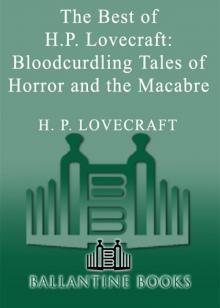 The Best of H.P. Lovecraft
The Best of H.P. Lovecraft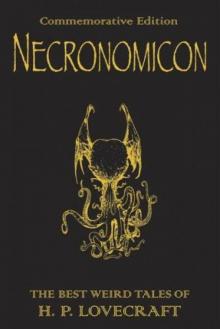 The Definitive H.P. Lovecraft: 67 Tales Of Horror In One Volume
The Definitive H.P. Lovecraft: 67 Tales Of Horror In One Volume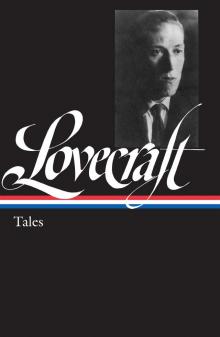 The Complete Works of H.P. Lovecraft
The Complete Works of H.P. Lovecraft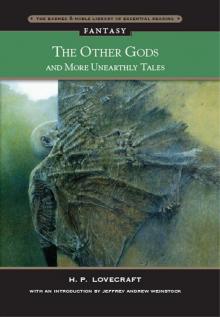 Other Gods and More Unearthly Tales
Other Gods and More Unearthly Tales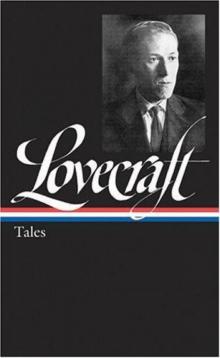 Lovecraft's Fiction Volume I, 1905-1925
Lovecraft's Fiction Volume I, 1905-1925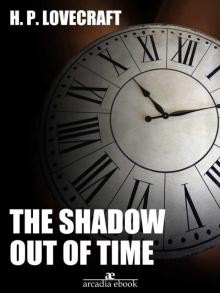 The Shadow Out of Time
The Shadow Out of Time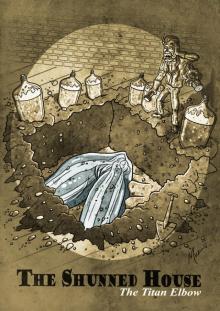 The Shunned House
The Shunned House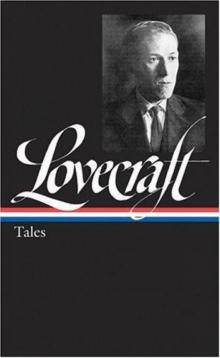 Lovecraft's Fiction Volume II, 1926-1928
Lovecraft's Fiction Volume II, 1926-1928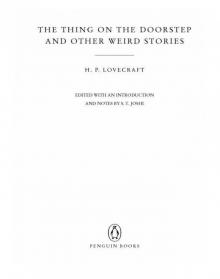 The Thing on the Doorstep and Other Weird Stories
The Thing on the Doorstep and Other Weird Stories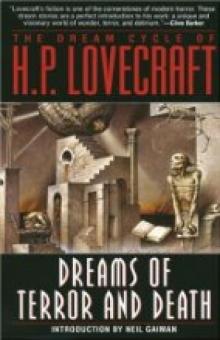 Dream Cycle of H. P. Lovecraft: Dreams of Terror and Death
Dream Cycle of H. P. Lovecraft: Dreams of Terror and Death Great Tales of Horror
Great Tales of Horror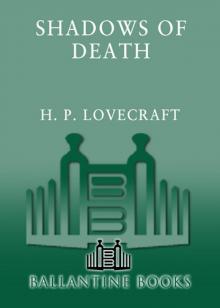 Shadows of Death
Shadows of Death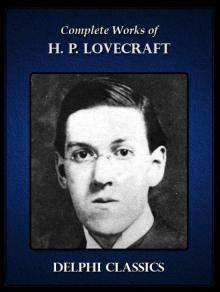 Delphi Complete Works of H. P. Lovecraft (Illustrated)
Delphi Complete Works of H. P. Lovecraft (Illustrated)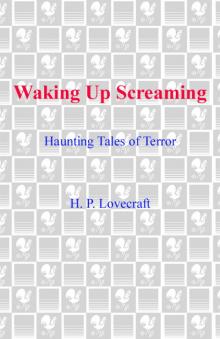 Waking Up Screaming: Haunting Tales of Terror
Waking Up Screaming: Haunting Tales of Terror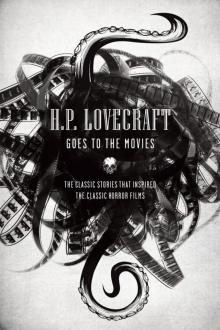 H.P. Lovecraft Goes to the Movies
H.P. Lovecraft Goes to the Movies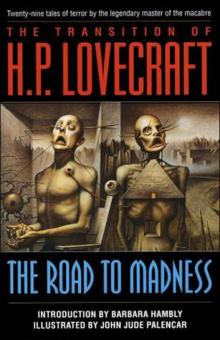 The Road to Madness
The Road to Madness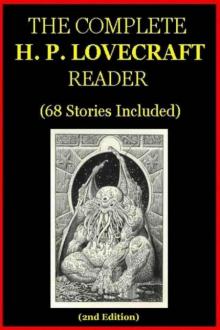 The Complete H.P. Lovecraft Reader (68 Stories)
The Complete H.P. Lovecraft Reader (68 Stories)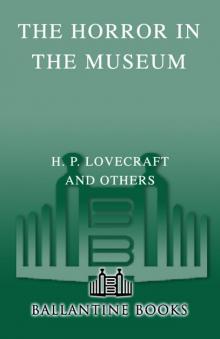 The Horror in the Museum
The Horror in the Museum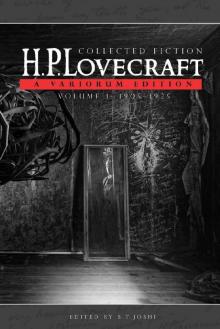 Collected Fiction Volume 1 (1905-1925): A Variorum Edition
Collected Fiction Volume 1 (1905-1925): A Variorum Edition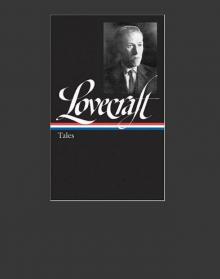 Lovecrafts_Fiction, vol.I_1905-1925
Lovecrafts_Fiction, vol.I_1905-1925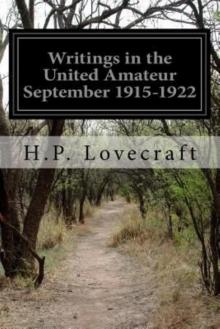 Writings in the United Amateur, 1915-1922
Writings in the United Amateur, 1915-1922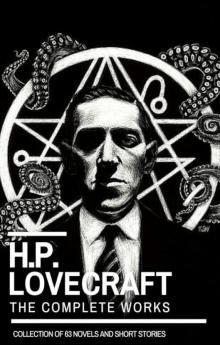 H.P. Lovecraft: The Complete Works
H.P. Lovecraft: The Complete Works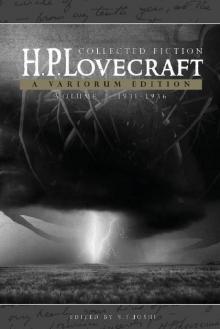 Collected Fiction Volume 3 (1931-1936): A Variorum Edition
Collected Fiction Volume 3 (1931-1936): A Variorum Edition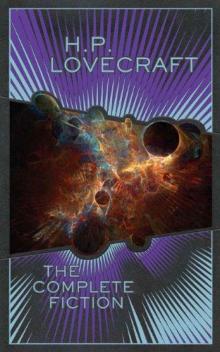 H.P. Lovecraft: The Complete Fiction
H.P. Lovecraft: The Complete Fiction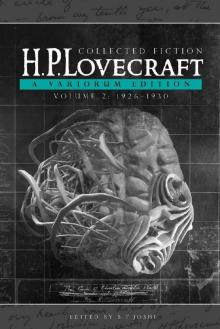 Collected Fiction Volume 2 (1926-1930): A Variorum Edition
Collected Fiction Volume 2 (1926-1930): A Variorum Edition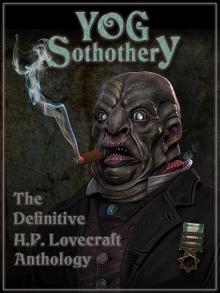 Yog Sothothery - The Definitive H.P. Lovecraft Anthology
Yog Sothothery - The Definitive H.P. Lovecraft Anthology The Complete H.P. Lovecraft Collection (Xist Classics)
The Complete H.P. Lovecraft Collection (Xist Classics)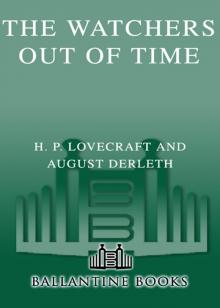 The Watchers Out of Time
The Watchers Out of Time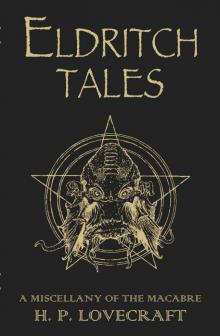 Eldritch Tales
Eldritch Tales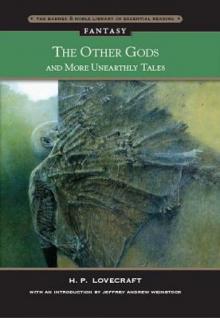 The Other Gods And More Unearthly Tales
The Other Gods And More Unearthly Tales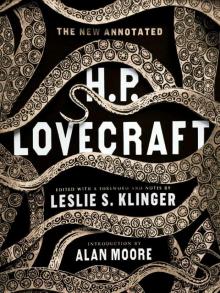 The New Annotated H. P. Lovecraft
The New Annotated H. P. Lovecraft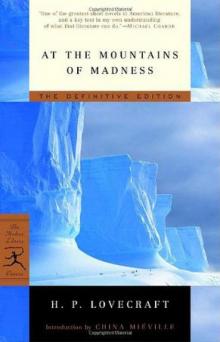 At the mountains of madness
At the mountains of madness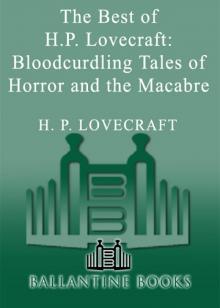 Bloodcurdling Tales of Horror and the Macabre
Bloodcurdling Tales of Horror and the Macabre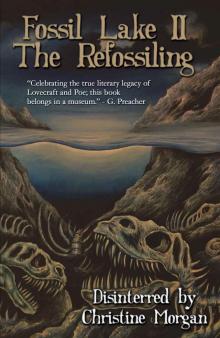 Fossil Lake II: The Refossiling
Fossil Lake II: The Refossiling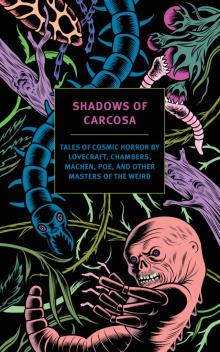 Shadows of Carcosa: Tales of Cosmic Horror by Lovecraft, Chambers, Machen, Poe, and Other Masters of the Weird
Shadows of Carcosa: Tales of Cosmic Horror by Lovecraft, Chambers, Machen, Poe, and Other Masters of the Weird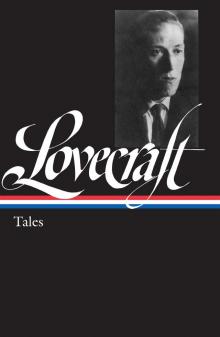 H. P. Lovecraft
H. P. Lovecraft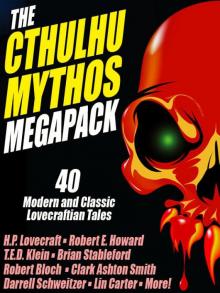 The Cthulhu Mythos Megapack
The Cthulhu Mythos Megapack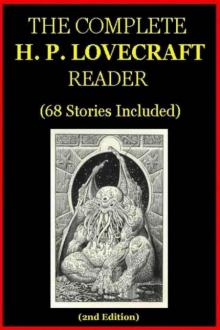 The Complete H. P. Lovecraft Reader (2nd Edition)
The Complete H. P. Lovecraft Reader (2nd Edition)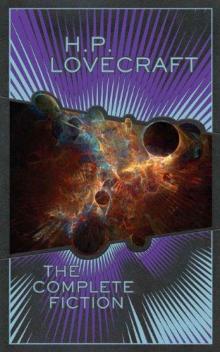 The Complete Fiction
The Complete Fiction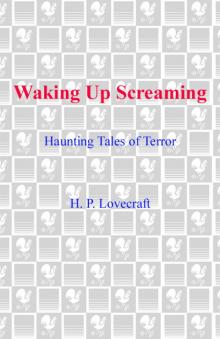 Waking Up Screaming
Waking Up Screaming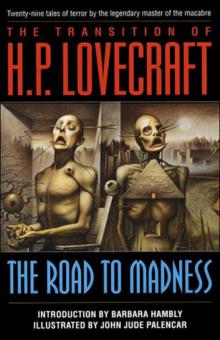 Transition of H. P. Lovecraft
Transition of H. P. Lovecraft![[1935] The Shadow Out of Time Read online](http://i1.bookreadfree.com/i2/04/12/1935_the_shadow_out_of_time_preview.jpg) [1935] The Shadow Out of Time
[1935] The Shadow Out of Time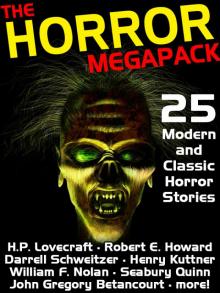 The Horror Megapack
The Horror Megapack